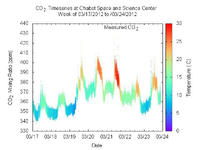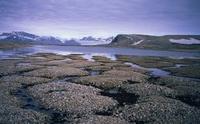-
Just-the-facts climate change Web site wins World Bank award
The World Bank award a prize to a Web site built to be the antidote to the many myths circulating online about climate change, myths which cause misplaced apathy or alarm; the site also reveals how responding to climate change presents a world of opportunities for individuals and entrepreneurs
-
-
U.K. potential food crisis
Many climate experts believe a slight rise in U.K. temperatures would be beneficial for the farming industry as yields could increase; as temperatures continue to rise, however, farmers would need to use more and more fertilizer on their crops and some livestock would not be as productive; consumers could thus face reduced food choices
-
-
B612 Foundation unveils first privately funded deep space mission
A private group plans to launch its own space telescope and place it in orbit around the sun; the mission will collect information about Earth-threatening asteroids, but also look for asteroids that may contain valuable raw materials for mining
-
-
First-of-its-kind CO2 sensor network deployed in Oakland

The City of Oakland will be ground zero for the first urban sensor network to provide real-time, neighborhood-by-neighborhood measurements of carbon dioxide and other air pollutants; the prototype network, being installed by chemists at the University of California, Berkeley, will employ forty sensors spread over a twenty-seven square-mile grid
-
-
Predicting wave power helps double marine energy

The energy generated from the oceans could be doubled using new methods for predicting wave power; researchers have devised a means of accurately predicting the power of the next wave in order to make the technology far more efficient, extracting twice as much energy as is currently possible
-
-
Growing interest in prairie cordgrassas a biofuel source

Until recently, prairie cordgrass (Spartina pectinata) has received comparatively little attention because, unlike the other types of switchgrass, it is not a good forage crop; as interest in energy crops and in feedstock production for cellulosic biofuels increases, however, prairie cordgrass is receiving more attention because it grows well on marginal land
-
-
Loo turns poo into power
Researchers have invented a new toilet system that will turn human waste into electricity and fertilizers and also reduce the amount of water needed for flushing by up to 90 percent compared to current toilet systems
-
-
Greater L.A. to heat up an average 4 to 5 degrees by mid-century
A groundbreaking new study shows that temperatures in the Los Angeles region to rise by an average of 4 to 5 degrees Fahrenheit by the middle of this century, tripling the number of extremely hot days in the downtown area and quadrupling the number in the valleys and at high elevations
-
-
Significant sea-level rise in a 2-degree warming world
Sea levels around the world can be expected to rise by several meters in coming centuries, if global warming carries on; even if global warming is limited to 2 degrees Celsius, global-mean sea level could continue to rise, reaching between 1.5 and 4 meters above present-day levels by the year 2300
-
-
Finding the best ways to protect infrastructure, recover from disasters
Researchers at Sandia National Lab bring the quantitative methods they have developed to the analysis of disasters and how best to recover from them; the researchers look at interdependencies among systems and supply chains, the resilience of various systems, how infrastructure systems fail, cascading effects, and how results might differ if a series of disasters hits instead of just one; the Sandia researchers say they can better quantify the results of such resiliency studies by taking a mathematically rigorous approach to objective assessments
-
-
California coastal infrastructure at risk from rising sea levels
An exhaustive study by the National research Council finds projects that the sea level off most of California is likely to rise about one meter over the next century, an amount slightly higher than projected for global sea levels; this will place much of the state coastal infrastructure at risk, because significant development along the coast — such as airports, naval air stations, freeways, sports stadiums, and housing developments — has been built only a few feet above the highest tides; for example, the San Francisco International Airport could flood with as little as 40 centimeters of sea-level rise
-
-
Seeping Arctic methane to pose serious problems for Florida coastline

Large quantities of methane gas are buried under the Arctic permafrost; the melting of ice caps in the Arctic causes this gas to escape into the atmosphere through vents; until recently, cryosphere (frozen soil and ice) has served to plug or block these vents, but thawing conditions have allowed the conduits to open, and deep geologic methane now escapes; methane is a very strong greenhouse gas, and its presence in the atmosphere has grown three times faster than carbon dioxide since the industrial era
-
-
Larger role for renewable energy in U.S. future than previously thought

Renewable electricity generation from technologies that are commercially available today, in combination with a more flexible electric system, is more than adequate to supply 80 percent of total U.S. electricity generation in 2050 while meeting electricity demand on an hourly basis in every region of the country; new study finds that renewable generation could play a more significant role in the U.S. electricity system than previously thought
-
-
Water for central Everglades essential for reversing ecosystem's decline
Twelve years into a $13.5billion state and federal effort to save the Florida Everglades, little progress has been made in restoring the core of the ecosystem, says a new congressionally mandated report from the National Research Council; expedited restoration projects that improve the quality and amount of water in this area are necessary to reverse ongoing declines
-
-
House bill allows Border Patrol to ignore environmental, safety protections along borders

The House of Representatives passed a sweeping bill which would allow the Border Patrol to ignore dozens of environmental protection laws — among them the Wilderness Act and Endangered Species Act — on all federally managed land within 100 miles of the Mexico and Canada borders; supporters argue that the measure is necessary to give the border patrol more freedom to chase illegal immigrants and drug smugglers; critics charge that the measure has little, if anything, to do with border security, and more to do with opening federally managed land to exploitation by private businesses, or pandering to local political constituencies
-
- All
- Regional
- Water
- Biometrics
- Borders/Immig
- Business
- Cybersecurity
- Detection
- Disasters
- Government
- Infrastructure
- International
- Public health
- Public Safety
- Communication interoperabillity
- Emergency services
- Emergency medical services
- Fire
- First response
- IEDs
- Law Enforcement
- Law Enforcement Technology
- Military technology
- Nonlethal weapons
- Nuclear weapons
- Personal protection equipment
- Police
- Notification /alert systems
- Situational awareness
- Weapons systems
- Sci-Tech
- Sector Reports
- Surveillance
- Transportation
Advertising & Marketing: advertise@newswirepubs.com
Editorial: editor@newswirepubs.com
General: info@newswirepubs.com
2010-2011 © News Wire Publications, LLC News Wire Publications, LLC
220 Old Country Road | Suite 200 | Mineola | New York | 11501
Permissions and Policies
Editorial: editor@newswirepubs.com
General: info@newswirepubs.com
2010-2011 © News Wire Publications, LLC News Wire Publications, LLC
220 Old Country Road | Suite 200 | Mineola | New York | 11501
Permissions and Policies
